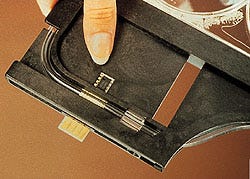Capacitor Plays Key Role in Maintaining Reliable Communication in Cancer Therapy System
April 1, 1998
MPMN Casebook
Capacitor Plays Key Role in Maintaining Reliable Communication in Cancer Therapy System
Decoupling unit met requirement for electronic noise suppression
When Therakos, a Johnson & Johnson Co. (Exton, PA), was developing its UVAR photopheresis system for the treatment of cutaneous T-cell lymphoma (CTCL), design engineers sought a highly reliable decoupling capacitor to provide electronic noise suppression.
The phototherapy system harnesses ultraviolet light with a pharmaceutical agent to alter the DNA of cancer cells and control the replication of abnormal blood cells. It maximizes toxicity to the target cells while minimizing the toxic effect to the patient since the photoactivation occurs outside the bloodstream. The UVAR system processes the patient's blood through a portable unit, cycling white cells and plasma through a Photoceptor chamber and then back to the patient. A PAC-1 memory chip in the Photoceptor plays a vital role in identifying the disposable chamber and guarding against cross-contamination of infectious disease.
To ensure error-free communication between the UVAR system and the Photoceptor unit, design engineers selected a Micro/Q 1000 flat decoupling capacitor manufactured by Circuit Components Inc. (Tempe, AZ) to decouple the memory chip. The Micro/Q 1000 capacitor, designed for through-hole mounting under dual in-line packages, is available in a variety of standard pin-outs as well as custom designs. This patented mounting configuration saves valuable printed circuit board space and enables the Micro/Q 1000 to provide a very low-impedance, low-inductance loop compared with conventional two-pin discrete capacitors.
 "Because the Micro/Q 1000 shares plated through-holes with the PAC-1 memory chip, it allowed us to obtain effective decoupling in this part of the system," says Dennis Briggs, senior research engineer at Therakos. The capacitor "provided a direct fit" for Therakos's requirements.
"Because the Micro/Q 1000 shares plated through-holes with the PAC-1 memory chip, it allowed us to obtain effective decoupling in this part of the system," says Dennis Briggs, senior research engineer at Therakos. The capacitor "provided a direct fit" for Therakos's requirements.
In clinical trials, the UVAR photopheresis system has proved effective in altering the course of CTCL in patients who had failed to respond to other therapies. Moreover, the treatment produced none of the side effects associated with classic chemotherapy, because the photoactivation occurs outside the patient's bloodstream. The Micro/Q 1000 capacitor's role in decoupling the PAC-1 memory chip contributed to the system's success.
You May Also Like

.png?width=300&auto=webp&quality=80&disable=upscale)
